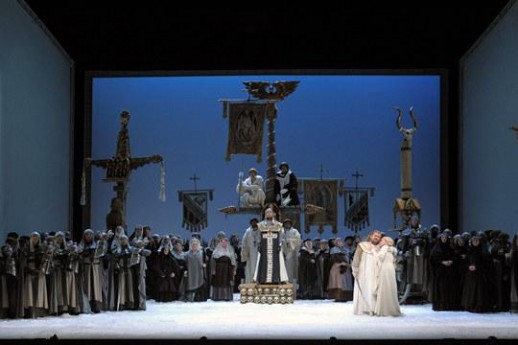
They are a spectacularly well-matched pair, a pair of Boteros, chubby and rotund in the old-fashioned grand opera style. Mr. Botha, a known quantity, has a huge, easy tenor that seems to relax in the killing high range of even the Richard Strauss tenor roles, tossing the high lines off with easy beauty. Wagner’s almost Italianate Lohengrin is not even a matter of endurance for him, long though it is in the third act.
His acting is, let us say politely, minimal, and his Act I duel with Telramund (slim Greer Grimsley, who has had to lose that duel to many a pachydermous tenor over the years and seems understandably depressed) is an embarrassment best not dwelt on. Botha is unlikely to improve in this department, and many may prefer his appearances in concert opera accordingly. In the Chicago staging, he was given as little as possible to do and brought it off well. You could shut your eyes; he sounded like a silver surfer up there, if not quite so otherworldly as Klaus Florian Vogt or as romantic as Jonas Kaufmann.
Elsa is Ms. Wagner’s breakout role. The American soprano has been singing Anninas and Kate Pinkertons, which is like casting Sutherland as the First Lady or the Priestess. I guess it gives a girl stage experience. Wagner is a large woman, but she moves with a determination, an understanding of her place on the stage and in the story that Jane Eaglen, for invidious comparison, notably lacked. And then Wagner starts to sing: a clear, cool, perfectly produced instrument from top to bottom, oceanic in size, gleaming in color, flawlessly on pitch, never shrill or harsh, gently filling the room in her soft singing, brilliant in loud, elegant in graceful Wagner turns.
Some may find her voice so perfect as to be dull, lacking in nuance where the ideal Elsa will be less certain, more crushable. But she is thirty, a splendid age for a youthful Hochdramatische. There is plenty of time for her to develop her view of this role, and tremendous pleasure in hearing her explore it so fearlessly. I’d say: Remember her name! but I don’t have to, do I? It’s Wagner; it’s fate.
Matching Grimsley’s familiar Telramund was the Ortrud of Michaela Schuster, who sings this role all over the world, as well as such similar parts as Venus and the Amme. All the acting one missed in the lovers was displayed in the second couple, and Ortrud’s interactions in Act II, her hypocrisies, her seductions, her Silent Movie facial contortions, were great fun. Vocally, too, this was her great scene – lacking the easy, oceanic power of the good guys, she was exciting but not, for once, the major game player in Antwerp. Her re-entrance for the final curse was hard work; it took a few phrases to warm up.
Georg Zeppensfeld and Lester Lynch sang King Henry and the Herald with dignity and honor. The chorus, on a night following the delicacy of singing Handel in English, had the surging power to fill the enormous theater of LOC with well-characterized Wagner. Sir Andrew Davis was curiously rushed during the first elegiac prelude, so that its mystical evocations did not make for much of a contemplative mood, but he calmed down later without ever letting the rhythm of this long, slow score slacken.
Wagner’s “romantic opera” was the most popular of his stage works up until World War I. It had a great appeal when unmarried women were still thought to be adorably innocent, yearning hopefully for knights in shining armor. The explosion of that naïve myth reduced the charm of Lohengrin for quite some time. Recently, as youthful psychology has been more intimately understood and opera direction has taken eccentric turns, Lohengrin’s popularity has revived: Elsa builds her dream house before our eyes, or Lohengrin sits at the piano, creating and refusing to let Elsa look at his incomplete ideas, or Ortrud becomes the bully in a high school classroom, or the whole thing as someone or other’s dream.
In Chicago they have brought over Elijah Moshinsky’s 1978 staging for Covent Garden, which is quite old-fashioned in its attempt to conjure something like a real tenth century Antwerp, though it takes its cues, rather, from Slavonic culture and the rituals and superstitions of the Russian Orthodox Church. Priests and nuns crowd the stage, and the artifacts and icons are nearly pagan; King Henry sits on a throne of skulls (borne aloft by monks), and a scrim marks the boundary between Lohengrin’s ideal Grail-world and our imperfect one.
As Leo Slezak, a great Lohengrin, was wont to say, “If there’s no bed in Act III, the audience knows the marriage isn’t going to work.” There isn’t, but we already knew it wouldn’t. And, magnificently as they sang, who wanted to see these stars cuddling in any case?
(Photo: Dan Rest / Lyric Opera of Chicago)


